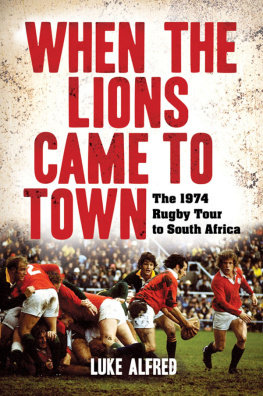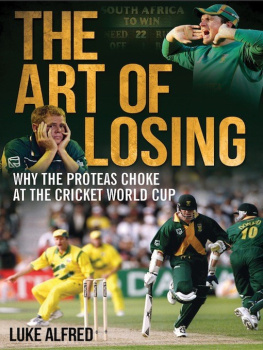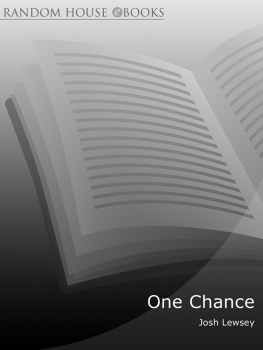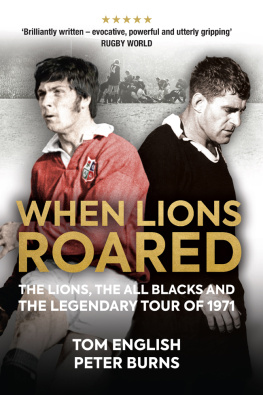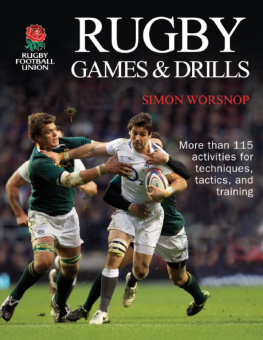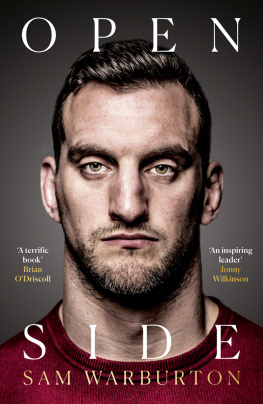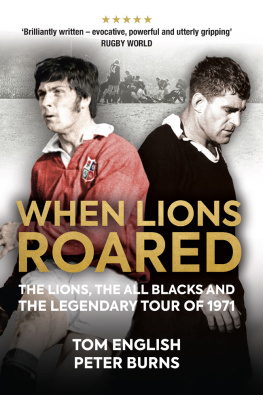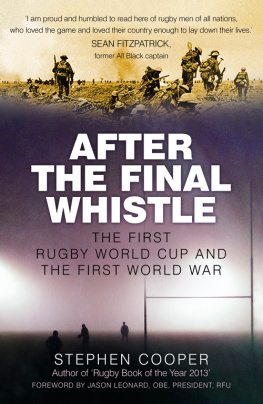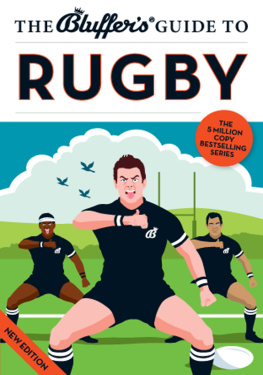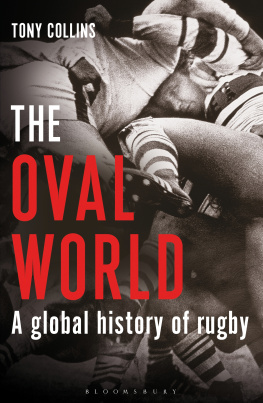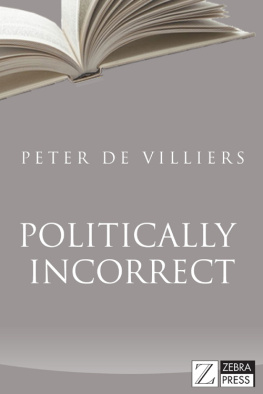Luke Alfred - When the Lions Came to Town: The 1974 Rugby Tour to South Africa (Rugby)
Here you can read online Luke Alfred - When the Lions Came to Town: The 1974 Rugby Tour to South Africa (Rugby) full text of the book (entire story) in english for free. Download pdf and epub, get meaning, cover and reviews about this ebook. year: 2014, publisher: Penguin Random House South Africa, genre: Detective and thriller. Description of the work, (preface) as well as reviews are available. Best literature library LitArk.com created for fans of good reading and offers a wide selection of genres:
Romance novel
Science fiction
Adventure
Detective
Science
History
Home and family
Prose
Art
Politics
Computer
Non-fiction
Religion
Business
Children
Humor
Choose a favorite category and find really read worthwhile books. Enjoy immersion in the world of imagination, feel the emotions of the characters or learn something new for yourself, make an fascinating discovery.
- Book:When the Lions Came to Town: The 1974 Rugby Tour to South Africa (Rugby)
- Author:
- Publisher:Penguin Random House South Africa
- Genre:
- Year:2014
- Rating:4 / 5
- Favourites:Add to favourites
- Your mark:
- 80
- 1
- 2
- 3
- 4
- 5
When the Lions Came to Town: The 1974 Rugby Tour to South Africa (Rugby): summary, description and annotation
We offer to read an annotation, description, summary or preface (depends on what the author of the book "When the Lions Came to Town: The 1974 Rugby Tour to South Africa (Rugby)" wrote himself). If you haven't found the necessary information about the book — write in the comments, we will try to find it.
Luke Alfred: author's other books
Who wrote When the Lions Came to Town: The 1974 Rugby Tour to South Africa (Rugby)? Find out the surname, the name of the author of the book and a list of all author's works by series.
When the Lions Came to Town: The 1974 Rugby Tour to South Africa (Rugby) — read online for free the complete book (whole text) full work
Below is the text of the book, divided by pages. System saving the place of the last page read, allows you to conveniently read the book "When the Lions Came to Town: The 1974 Rugby Tour to South Africa (Rugby)" online for free, without having to search again every time where you left off. Put a bookmark, and you can go to the page where you finished reading at any time.
Font size:
Interval:
Bookmark:


Published by Zebra Press
an imprint of Random House Struik (Pty) Ltd
Reg. No. 1966/003153/07
The Estuaries No. 4, Oxbow Crescent, Century Avenue, Century City, 7441
PO Box 1144, Cape Town, 8000, South Africa
www.zebrapress.co.za
First published 2014
Publication Zebra Press 2014
Text Luke Alfred 2014
Photographs:
Cover Getty Images/Allsport
: Colorsport/Colin Elsey
Every effort has been made to trace copyright holders and to obtain their permission for the use of copyright material. The publisher apologises for any errors or omissions and would be grateful if notified of any corrections that should be incorporated in future reprints or editions of this book.
All rights reserved. No part of this publication may be reproduced, stored in a retrieval system or transmitted, in any form or by any means, electronic, mechanical, photocopying, recording or otherwise, without the prior written permission of the copyright owners.
PUBLISHER: Marlene Fryer
MANAGING EDITOR: Robert Plummer
EDITOR: Bronwen Leak
PROOFREADER: Ronel Richter-Herbert
COVER DESIGNER: Jacques Kaiser
INDEXER: Robert Plummer
ISBN 978 1 77022 653 1 (print)
ISBN 978 1 77022 654 8 (ePub)
ISBN 978 1 77022 655 5 (PDF)
Contents
Acknowledgements
T HREE MEN, TWO of whom watched the 1974 Lions tour live, were of invaluable assistance in helping me write this book, clearing up facts and providing me with fresh information and insight. John Griffiths, the English rugby historian, was remarkably generous with queries and historical morsels I would not have been able to find elsewhere. He has a wonderful memory and was able to provide answers to some deeply trivial questions like: What is a Welsh love spoon? Herman le Roux, the former rugby writer and sports editor of Volksblad was unfailingly polite and similarly helpful. He allowed me access to his scrapbooks, notebooks and cuttings files and dealt with any number of questions. A hearty thanks to both of you. Mike Shafto, who covered the tour for The Star and was the ghostwriter of Willie John McBrides local newspaper column, was another great help. We had numerous long telephone conversations, particularly in the planning and early stages of the book. You were always a source of inspiration, Mike. It was no different this time.
Words of considerable thanks must also go to Albert Grundlingh, head of the history department at Stellenbosch University. Albert was always on hand to open the SA Rugby archives at the university for me and have a burger and beer afterwards many thanks for your generosity and your warm-heartedness. Thanks, too, to Veronica du Plessis and her husband Nico, the custodians of the Choet Visser Rugby Museum in Bloemfontein. As the late Choets daughter, Veronica was my guide through the museum. She also allowed me access to books, programmes and anniversary brochures I would not have been able to find otherwise. Thanks for your time and hospitality both of you. Finally, a big thanks to my good friend and former colleague Clinton van der Berg. Without even knowing it, Clint, you were a fount of great encouragement. You were keen on the project from the very beginning and were always there to egg me on.
Friends, former colleagues and rugby people I happened to bump into along the way who also offered help, time, encouragement and advice include Darryl Accone, Dan Retief, Duane Heath, Donald McRae, John Bishop, Pietman Retief, Albert Heenop, Niels Momberg, Hymie Sybul, Hermann Giliomee, Krish Naidoo, Liam Del Carme and John Dobson. Heartfelt thanks, too, to the documentary filmmaker, Mark Kaplan, for the videos and conversation.
Finally, to the former players and members of the coaching elite. All of you gave generously of your time, but I will always remember my interviews with Johan Claassen, Anton Oberholzer, Paul Bayvel, Hannes Marais and Dugald MacDonald.
LUKE ALFRED
KENSINGTON
JULY 2014
Introduction
T HE SOUTH AFRICA of 40 years ago was a country of hearty contradictions. The fist of the local economy punched above its weight in international terms, yet the fingers of that fist held tight the countrys riches. Skyscrapers were circled by highways that made them look like the cities of dreams, while lurking just over the horizon were townships with bad water and poor air, where there were few trees and fewer fields on which to play. A paranoid, racially obsessed regime fted in Washington was in command, yet the old orders of Africa were crumbling. The Portuguese were packing their suitcases, filling Luandas lift shafts with concrete and scurrying home. Only Ian Smiths Rhodesia (why always that formulation, as though Smith was Rhodesia?) stood between South Africa and what we were told was communisms dastardly red tide. The world looked occasionally at the continents southern tip and wondered with slight distaste, presumably what might become of it all. Would the country be washed in rivers of blood? Or would the men in hats allow their power to melt quietly away?
Possibly because rugby developed in conjunction with the rise of Afrikaner nationalism, and possibly because the game was played far away from the centres of the world whose respect white South Africans so desperately craved, the sport had always been tied up with white identity even, at a push, white soulfulness. So when Willie John McBrides British Lions arrived in the country in the winter of 1974, it was no common tour. They had won splendidly in New Zealand in 1971 and there was a suspicion at large that British rugby was physically and intellectually superior to anything the Springboks might have to offer. Full of loveable anachronisms in tweed jackets, the dominion of local rugby was in an unhealthy phase. It might have been parochial, it might have been decadent, but whatever it was, it was in bad shape. It lacked technique, imagination and international exposure. And that was just the beginning.
It did not help that South Africans were already beginning to feel the pinch of isolation. Before the 1974 Lions arrived, politics had already conspired to lose them a tour to New Zealand and a visit by Wales. Neither were they insensitive to the worlds growing disapproval. They wanted to prove themselves by winning but they also wanted to beat the Lions to demonstrate that they were worthy of being played again. It was almost as though they were playing against 30 men.
South Africa had played only one Test since their victorious tour of Australia in 1971, and with a clutch of retirements they were unsure of who their best players were and who was best to lead them. They plumped for onse Hannes, our Hannes, the 33-year-old tighthead prop, Hannes Marais. He would not fail them, the selectors felt sure, but could he do one better? Could he galvanise a team who had never played together before? Could he meld north and south, young and old, English and Afrikaans, the mischief of Morn with the dour workings of Piston in the front row? The public certainly wanted to think so, and they watched it all with a fascination bordering on rapture.
Such was the excitement and public scrutiny that 50 000 people turned up at Ellis Park on a Thursday afternoon to watch the Quaggas, a hastily assembled invitation side, narrowly lose to the Lions. Some weeks later, at the same venue, 75 000 people, almost all of them white, took advantage of 10 000 temporary seats to watch a 13-all draw in a series that had already been decided. It was not long ago, but it somehow seems strangely distant. It was a time before democracy and a time before television, a time before professionalism and a time before irony. In many ways sporting, political and cultural it was one of the most exciting and interesting tours of the pre-professional age.
Next pageFont size:
Interval:
Bookmark:
Similar books «When the Lions Came to Town: The 1974 Rugby Tour to South Africa (Rugby)»
Look at similar books to When the Lions Came to Town: The 1974 Rugby Tour to South Africa (Rugby). We have selected literature similar in name and meaning in the hope of providing readers with more options to find new, interesting, not yet read works.
Discussion, reviews of the book When the Lions Came to Town: The 1974 Rugby Tour to South Africa (Rugby) and just readers' own opinions. Leave your comments, write what you think about the work, its meaning or the main characters. Specify what exactly you liked and what you didn't like, and why you think so.

